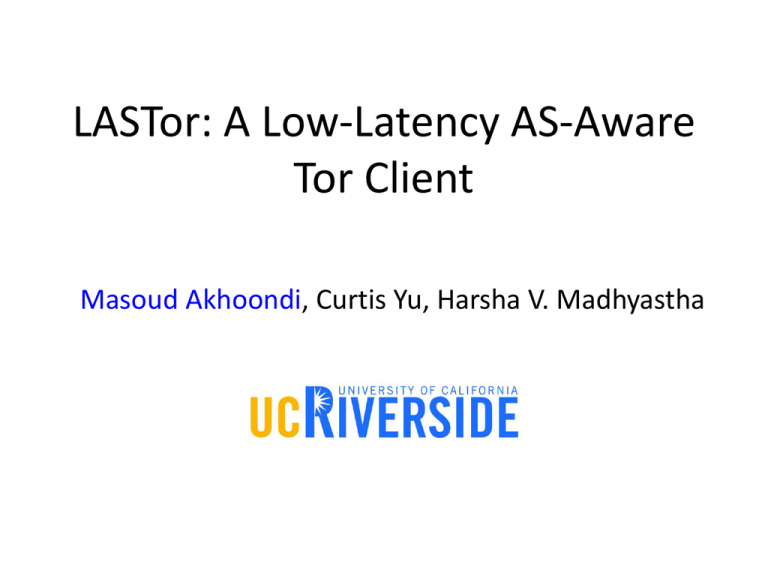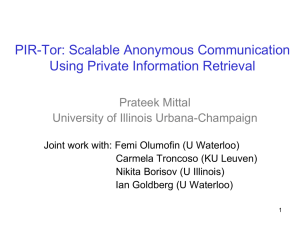LASTor: A Low-Latency AS
advertisement

LASTor: A Low-Latency AS-Aware Tor Client Masoud Akhoondi, Curtis Yu, Harsha V. Madhyastha Tor (The onion router) D R3 R2 S R1 • Anonymity - Each hop only knows previous and next hop on a path • 400,000 users • Low latency communication • is2700 relays[Mccoy08] - 90% of Tor traffic interactive How are latencies on Tor? – Sources: • 50 PlanetLab nodes spread across globe – Destinations: • Top 200 websites CDF of (src, dst) pairs • Experiment: 1 0.8 0.6 0.4 5x inflation in median 0.2 No Tor Default Tor 0 0 0.5 1 1.5 Latency (sec) 2 3 Profiling attack on Tor Green AS (Autonomous System) can eavesdrop on both end segments of path[Murdoch07] S Entry segment Entry relay Relay 2 Exit segment Exit relay D 1 .8 .6 .4 .2 0 0 0.2 How severe is profiling attack? 0.4 0.8 Tor relays 0.6 CDF of ASes 65% of relays are in 20% of all ASes 1 Non-uniform distribution of relays across ASes 5 Potential solution for these problems • Measure latencies and routes from each relay to all end-hosts [Sherr09, Alsabah11, Mittall11] – Requires modification of relays • None of these proposals deployed yet – Non-trivial to implement Main insight: Client modifications suffice Improve poor latency for interactive communications Mitigate profiling attack LASTor: A low-latency AS-aware Tor client Main insight: Client modifications suffice Improve poor latency for interactive communications Solution: Modified path selection to reduce latency Mitigate profiling attack Solution: AS-aware path selection Goal: Improve latency Sources of latency on Tor • Queuing and processing delay – Congestion in relays [Panchenko09] • Propagation delay – Long paths D S Goal: Improve latency Shortest path vs. Default Tor • Destinations: • Sources: – 50 PlanetLab nodes spread across globe • Map relays to geographical locations CDF of (src, dst) pairs – Top 200 websites 1 0.8 50% improvement in median 0.6 0.4 0.2 No Tor SP Tor Default Tor 0 0 Shorter paths can greatly reduce latency 0.5 1 1.5 Latency (sec) 2 Path should not be deterministic Weighted Shortest Path (WSP) 10 Goal: Improve latency Weighted Shortest Path (WSP) • WSP computes length of all possible paths • Probability of choosing is inversely proportional to its length 3 1 3 1 1 2 4 Path Length Prob. Uppe r 8 Lower 10 0.56 0.44 3 11 Goal: Improve latency An Attack on WSP Attacker controls a relay 1 3 3 1 1 2 4 3 Original prob. Prob. Compromised paths 0.56 0.8 Other paths 0.44 0.2 Goal: Improve latency Solution: Clustering of relays 1 3 3 1 1 2 4 3 • Run WSP using clusters of relays • For chosen cluster-level path, randomly pick a relay in each cluster Goal: Improve latency Solution: Clustering of relays 1 3 3 1 1 2 4 3 Prob. Compromised paths 0.56 Other paths 0.44 Goal: Improve latency Weighted Shortest Path (WSP) • Preprocessing – Cluster all relays • Path selection – Computes length of possible paths using clusters – Choose a path with a probability inversely proportional to its length – Pick a relay randomly in each chosen cluster • Other issues (see paper) – Handling multi-location destinations – Choosing entry relays Goal: Improve latency WSP reduces latency CDF of (src, dst) pairs 1 0.8 0.6 0.4 0.2 0 0 WSP Default Tor 0.5 1 Latency (sec) 20% improvement in 80th percentile 25% improvement in median 1.5 2 50 PlanetLab nodes to top 200 websites 16 Goal: Improve latency Tunable path selection in LASTor • Modify WSP to consider user’s preference towards: – Anonymity – Latency • Single parameter α configured by user: – Modified weight w to w(1-α) where 0 ≤α≤ 1 0 Lowest latency α 1 Highest anonymity 17 Goal: Improve latency Tunable path selection in LASTor Lower α, lower latency Higher α, higher anonymity Gini Coefficient measure of inequality in a distribution 0: perfect equality 1: maximal inequality 18 Main insight: Client modifications suffice Improve poor latency for interactive communications Solution: Modified path selection to reduce latency Mitigate profiling attack Solution: AS-aware path selection Goal: AS-aware Profiling attack on a path Green AS (Autonomous System) can on eavesdrop on both segments of Goal: Detect common ASes entry and exitend segments path[Murdoch07] S Entry segment Entry relay Relay 2 Exit segment Exit relay D Goal: AS-aware CDF of (src, dst) pairs Simple heuristic does not work 1 0.9 0.8 0.7 0.6 0.5 0.4 0.3 0.2 0.1 0 57% of common AS instances are missed Same /16 0 20 40 60 80 100 False negative rate (%) • Default Tor ensures no two Tor relays in same /16 • False negative: fraction of paths with common AS not detected Goal: AS-aware Need for predicting AS paths • Approach 1: Measure routes from relays to all end hosts – Need to modify relays • Approach 2: Infer AS-level routes – Several techniques exist [Mao05, Madhyastha06, Madhyastha09, Lee11] – At best 70% accuracy Exit relay D Goal: AS-aware Our solution: AS set prediction Exit relay D Predict ASes on all paths compliant with routing policies Goal: AS-aware Our solution: AS set prediction Exit relay D Predict ASes on all paths compliant with routing policies Goal: AS-aware Our solution: AS set prediction • Input [13MB initially, 1.5MB weekly] – Topology graph at AS-level – Estimate of AS path length – Compact representation routing policies: • Triple of (AS1, AS2, AS3) where AS1AS2AS3 • Algorithm – Modified version of Dijkstra’s algorithm • Output – Set of ASes on policy-compliant routes Goal: AS-aware CDF of (src, dst) pairs AS set based prediction is accurate 1 0.9 0.8 0.7 0.6 0.5 0.4 0.3 0.2 0.1 0 11% of common AS instances are missed 57% of common AS instances are missed AS sets Same /16 20 40 60 80 100 0 False negative rate (%) • False fraction of paths with common AS not Anynegative: path selection algorithm can use ASdetected set predcition to avoid profiling attack 26 LASTor Latency CDF of (src, dst) pairs 1 WSP 0.8 WSP+AS sets Default Tor 0.6 0.4 0.2 0 0 1.5 1 0.5 Latency (sec) 2 50 PlanetLab nodes to top 200 websites 27 Summary • Demonstrated client side changes are sufficient for: – Lower latency – Higher anonymity • Designed and implemented LASTor – Reduces median latency by 25% – Reduces median false negative of common AS from 57% to 11% 28 Thank you 29 How does Tor work? (Onion Routing) Entry Relay (guard) Exit Relay Client Server R1 R3 R5 R4 R2 Middle Relay - 300,000 users - 2700 relays 30 1 0.8 0.6 0.4 0.2 0 0 0.2 Is distance a good estimation of latency? 0.6 0.8 Weighted SP Weighted Latency 0.4 Latency (sec) 1 • Choose two different paths: – WSP(latency) – WSP(distance) • Measure latency on these two paths • 50 planetlab nodes as source and top 200 websites as destination There is no significant difference between these two metrics 31 Goal: AS-aware CDF of (src, dst) pairs Accuracy of AS-set prediction algorithm 1 0.9 0.8 0.7 0.6 0.5 0.4 0.3 0.2 0.1 0 AS sets E&S iPlane Same AS 0 20 40 60 80 100 False negative rate (%) 32 Attack on WSP Goal: Improve latency CDF of (src, dst) pairs 1 0.8 0.6 0.4 0.2 0 With clusters,25x No clusters,25x 0 10 20 30 40 50 60 70 80 50% reduction Clustering of relays reduces: - Probability of the attack - Running time of WSP • Adversary replicates 10% most popular relays 25 times • Compute probability of the chosen path traversing a malicious relay 33







